The Ultimate Guide to Becoming A Digital Nomad Family
Want to become a digital nomad family but don’t know where to start?
Most people assume that becoming a digital nomad is only possible for those that are young and child-free with little to no responsibilities. And to be honest, looking back just a few years ago, this probably was the more common assumption. However, we’re proof that you can have kids and become a digital nomad family. And we want to encourage more people to give it a go!
We’ve been travelling part time with our toddler and baby as a digital nomad family for the last 3 years. We love the nomadic lifestyle! It’s given us the chance to visit some amazing countries along the way, and we’ve learnt a lot for doing it. We’ve learnt things such as how to find local schools, how to make friends along the way and how to make sure that you have a great work-life balance. Join us as we tell you more about how to become a digital nomad family.
What is a digital nomad family?
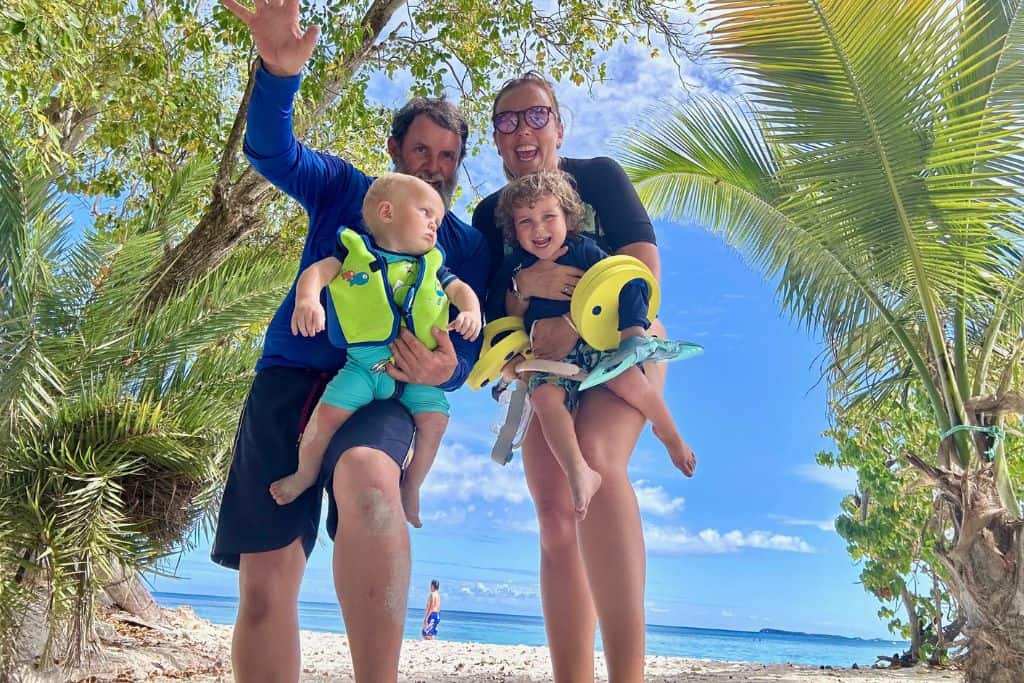
A quick search online will show that the definition of a digital nomad. It is “someone who does not have a permanent office or home and works from different countries, towns, or buildings using the internet”. We took that particular definition from the Cambridge Dictionary, however, after a quick online search you’ll find hundreds more like it. Simply put, it’s a person who travels from place to place while working remotely.
A digital nomad family is when children and a sometimes second parent (who may or may not work) travel alongside a digital nomad. At least one parent will have a digital nomad job that allows them to travel wherever and whenever they’d like. In our case, I’m the digital nomad.
By blending their work and travel, digital nomad families create opportunities for their children to learn about different cultures, languages, and ways of life. With the right planning and organisation, it is possible to create a harmonious balance between work and family life while exploring the world together.
In recent years, more and more families have started to live a digital nomad lifestyle. We think it’s likely becoming more common as there are more opportunities for a parent or parents to work remotely. Plus there are now online communities devoted to sharing information surrounding being a digital nomad family. For example, some recommend places to go, have options to meet up with other families and even share schooling ideas such as world-schooling hubs and online learning resources. For families it has become a lot easier to chase your travelling dreams!
What do digital nomads do for work?
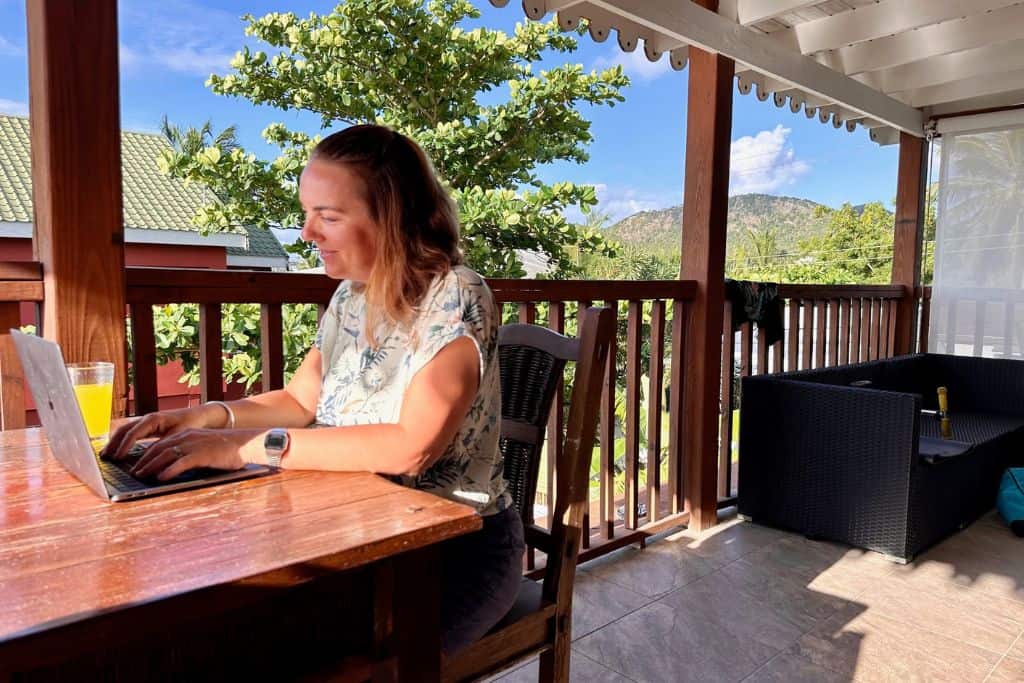
There are so many jobs that digital nomad parents could have. Especially recently as more companies become open to offering remote work as an option post the pandemic. There was a myth that you have to be self-employed or a freelancer to be able to be a digital nomad. However, this just isn’t true anymore, and I’m an example of that as I’m employed at a tech start-up.
Digital nomad work ideas
We’ve met many digital nomads on our travels and here’s a list of some of the roles that they’ve had:
- travel bloggers
- accountants
- software developers, UX designers
- virtual assistants
- writers, editors & translators
- consultants
- language teachers
- marketing & sales agents
- travel agents
This isn’t a finite list of jobs. There are lots of other jobs that have become suitable for remote working in recent years. Some companies, like the one I work for, now have a digital nomad work policy in place to make it easier to apply to work and live abroad. If they don’t then it’s still worth asking, it might be that they’ve just not considered offering remote working before.
Our digital nomad family experience
How we became a digital nomad family
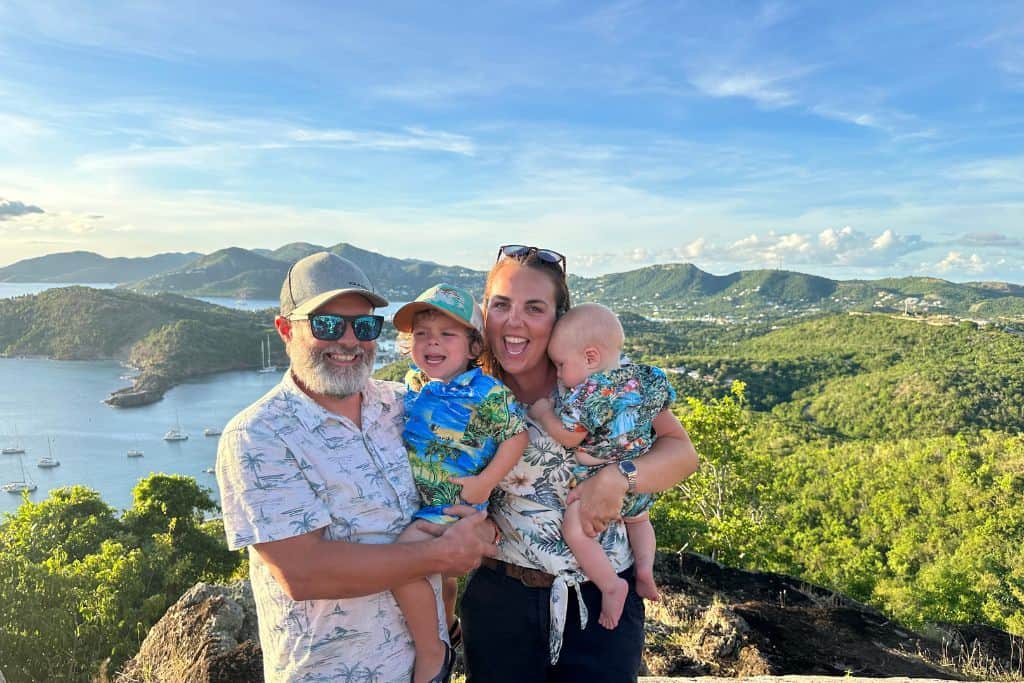
The funny thing is that we accidentally fell into the being a digital nomad family. Carl has always worked as a yacht captain sailing around the world. Before we had the boys I’d regularly hop on a flight and spend a week or two out with Carl as he travelled around. And occasionally he’d pop back to the UK. Our sporadic life pre-kids was fun and exciting, and we knew that we didn’t want to limit ourselves if we had children.
At the time I was a spa director for a large luxury hotel in the UK. Then the pandemic hit, and we were excited to discover I was pregnant. We knew that we needed to find a way that I could travel out to Carl with our soon-to-be baby so that we could travel as a family.
I had a lot of transferable skills and secured myself a role in the sales team for a tech start-up, straight up, I explained our family situation. It helped that the owners were both avid sailors and knew that I was keen to follow Carl around the world with Cameron. I work part-time for them doing 3 days a week. When I’m abroad I flex my hours to make sure they work for the business needs. For example, in Antigua, I work early mornings five days a week. This means that I’m still able to log on during UK work hours.
Why we aren’t a full time digital nomad family
I think it’s important to add, that we don’t travel full time. This is because we really love our time back in the UK to see our friends and family. We find that this helps with making sure that the boys don’t miss our friends and family at home. We spend roughly 6 months of the year following a digital nomad family life.
Living our digital nomad family life in Antigua
We’ve spent the last 3 winters living in Antigua, and digital nomad family life has worked very well for us. Cameron who is now 3 years old goes to the local pre-school there and has made some incredible friendships. And Dylan our youngest has a fantastic nanny who cares for him. We’ve also made lots of lasting friendships as a family by chatting to other families on the beach. The same families return each winter and we look forward to catching up with them. Carl is fortunate that he’s able to start work early in the morning and we generally have the afternoons together as a family. A few evenings in the week Carl goes back to the boat to socialise with the guests onboard. To make the work-life balance work, we’ve really focussed on making our timings work.
Our European digital nomad family travels
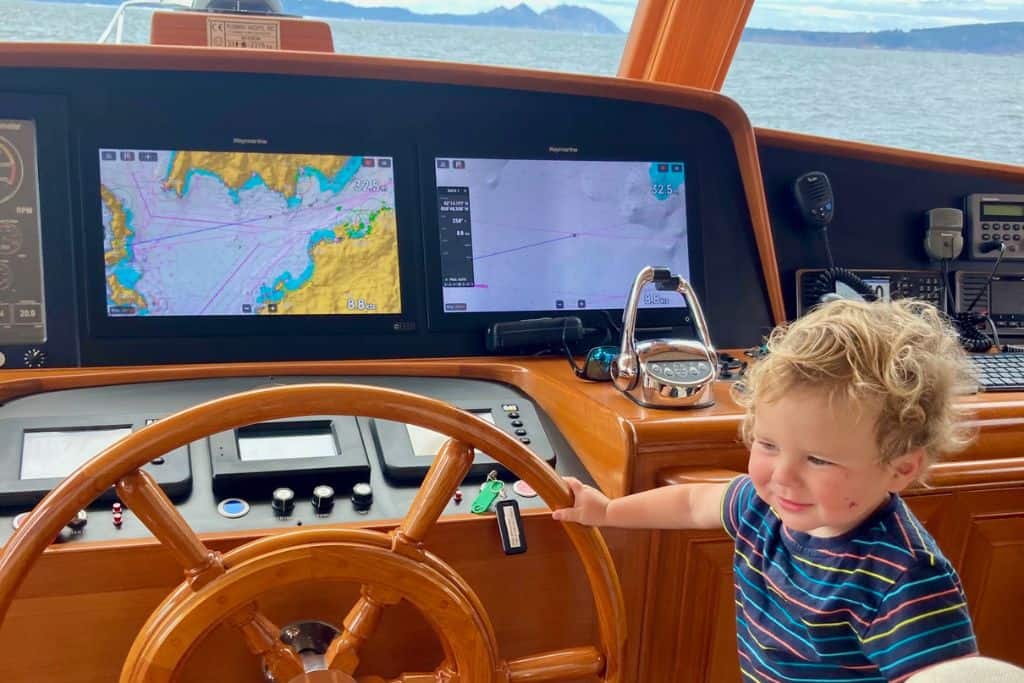
In the summers we are based out of our home in Hamble in the UK and travel around Europe. Sometimes for just a few weeks at a time as Carl takes shorter temporary contracts. We once spent 6 weeks in Baiona in Spain whilst Carl worked. At the time it was easier we only had Cam to look after. We decided not to use a local pre-school or nanny. Instead, I’d start work each day at 5:30 am and get my work done early whilst Carl looked after Cam. I’d finish at 10:30 am and then Carl would start work whilst I would look after Cameron. Then in the early afternoon Carl would finish for the day and we’d then go hang out as a family. It’s not always easy, however, we wouldn’t change a thing as we love our nomadic family lifestyle.
Looking after our family dog
We also at home have our wonderful dog, Cavendish who is a black lurcher. When we do away we also have to make sure that he is taken care of. When we first started to follow a nomadic lifestyle Cav would go for holidays at our friends’ houses whilst we travelled. Then we had a housemate come to live with us (thank you Abby). However, to make things easier for Cav as he’s getting older, we either have our friends to stay over at our house. Or, we use a fantastic website called Trust Housesitters.
We’ve not taken Cav with us on any of our adventures. This is because he’s an older dog and he’s not too keen on car travel and it makes him anxious. Because of this, we don’t want to put him through the potential stress of taking the flight to Antigua. We do, however, have friends who bring their dog to Antigua each winter which works really well for them.
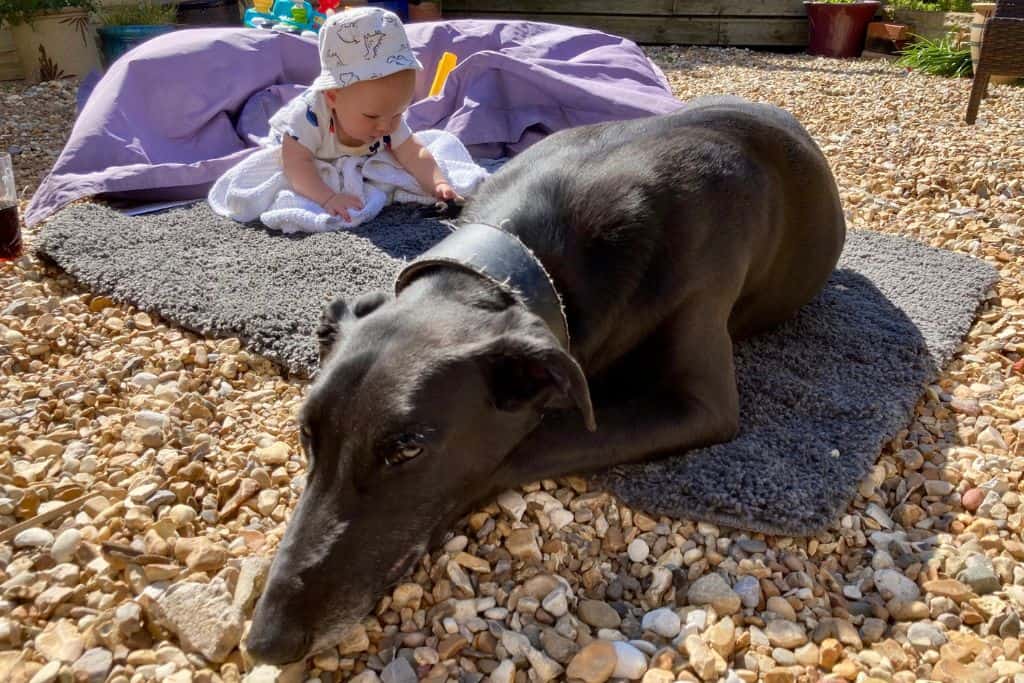
Benefits of being a digital nomad family
A nomad lifestyle on the road is very different to a normal way of life. However, what we love is that it’s a much more memorable way to live as a family. The great thing is that you have the freedom to move whenever you feel like you’re ready for your next adventure. If you find one particular village, town or city that you love, then you can stop for a while, like month or two, or even perhaps a year! And, if you get itchy feet then you can simply move on and try somewhere new.
We’ve always travelled a lot, and this allows us to continue to travel even though we now have our children with us. The world has become my office. As long as I’m online to work when I need to be, then we have great flexibility for me to work wherever Carl’s work takes us. It’s always way more fun to work somewhere new and know that you’ll be off exploring at the end of your working day and at weekends!
Benefits of being a digital nomad family for kids
For kids, like our boys, there are loads of benefits to living abroad. You’ve got the cultural aspects of experiencing more of the world, learning another language and making friends from different cultures. We’ve also noticed, that kids from digital nomad families can gain extra soft skills. Things such as being able to adapt to their surroundings more and being more flexible in the way they approach life.
For example, our son Cameron will happily start playing with local kids even if he can’t speak their language. He’s happy to adapt the way that he plays to fit in with their games, and is confident enough to just join in with another group as they play. The same goes with adults, he’s super happy asking questions – he’s most definitely still in the “why” phase!
A different kind of education for kids
There’s also the education side of things. Because they’ll get to learn lots that is outside of the usual school curriculum. For instance, learning about different wildlife, ways of living and how to do things in a different way to what they are used to. In fact, there are whole groups online who focus on setting up world schooling camps. These are where digital nomad family kids can get together to learn outside of the curriculum together. We’ve yet to try one, but would love to hear your experience if you have!
Enjoying family time together
For the entire family, it’s the chance to spend quality time together enjoying a different experience to the norm of your home country. Whilst visiting different countries together. We love our family time!
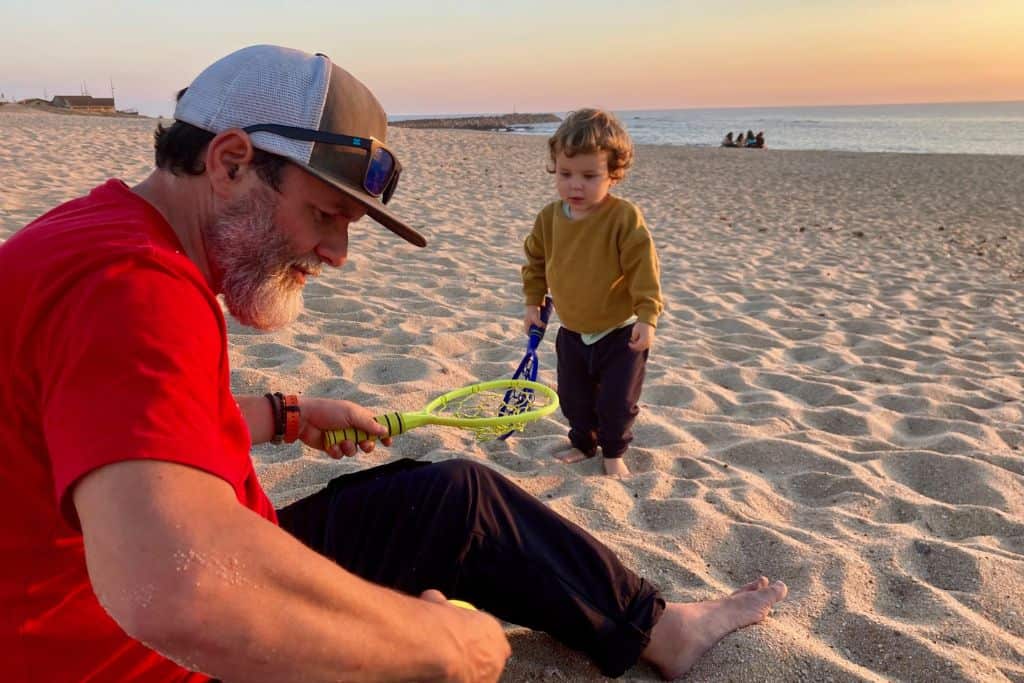
Downsides of being a digital nomad family
Of course, we’d be crazy not to mention some of the challenges you might face as a digital nomad family. The main ones we’ve experienced are missing our friends at home and making new friends where we stay. We’ve gone into a bit more detail and given some top tips in order to help you with some of the downsides. That’s because if you can beat the challenges then it becomes a lot easier to enjoy the travelling experience!
Missing your friends at home
The biggest one that we’ve encountered is the emotional side of saying goodbye to our family and friends before we go. Particularly as our eldest son is getting older, he’s started to talk about missing his friends from home each time we leave. In our case, we always know when we’ll be back and so we plan in advance fun things to do with our friends and family when we get back. If you’re not sure when you’ll be back then leaving can be very tough. Saying goodbye is definitely easier for us as parents.
In order to help Cam with missing his friends, we regularly send his friends little videos from him, and their parents are great at sending them back to us. We’ve tried calls, but inevitably as toddlers they get on the call and freeze, so you end up with no chatting just awkward silence! We know that as the boys get older they might struggle a little more with saying goodbye. Because we’ve met families with other kids who’ve inevitably cut their travel short as their children can’t adjust to the nomadic lifestyle. Travelling with babies and very young kids is definitely a lot easier.
Making new friends
Once you start travelling it can be hard to make friends. This is particularly the case if you aren’t stopping in one place for long. We’re lucky that Cam loves to chat and will happily introduce himself in a play ground and make “new friends” as he calls them. However, as he gets older this might perhaps become harder for him to do. We’ve started to think ahead and have found that online there are some digital nomad family groups. These give you a chance to arrange to meet other families with kids of a similar age. Also, if you join these groups there are some people that arrange to travel as a community with several families travelling together and taking a teacher with them.
Your pets
If you’ve got pets, like we do, then you’ll need to think about your plans for them. We usually have someone look after our dog whilst we are away – it’s like a mini-holiday for him. Or, perhaps you might decide to take them with you like our friends do each year when they fly out to Antigua for the winter. You’ll want to research the logistics of taking your pet aboard, because this really does vary between countries.
Planning ahead things to consider
There is a lot to plan and consider before making the change to becoming digital nomads. We’ve tried to cover as many of them as possible for you. You’ll have a lot of research to do, however, hopefully, these help to kick-start your planning.
Legal aspects of digital nomad life visas and tax
Visas and right to work
In order to live and work in any country legally, you’ll need to make sure that you have the legal right to work there and/or a valid visa to do so. An easy example is that if you hold an EU passport you might consider travelling from one country to another within the EU as digital nomad parents and you wouldn’t need a visa.
If you’re planning on heading to a country where you don’t have the legal right to work and live, then you’ll need to apply for a digital nomad visa. You’ll need to apply before you go, and depending on where you apply, some of the applications are easier than others to complete. As part of the application process you’ll be asked to provide a variety of documents. One things that they tend to ask for is “proof of earnings” so that they know that you can afford to live there. This might affect which countries you’d be eligible to apply for.
How long you can stay varies from country to country, we had a quick look online and the visas vary from 3-month stays such as in Estonia and Vietnam, all the way up to 10 years in Thailand.
The exciting news is that there are now over 50 countries that offer digital nomad visas – which makes families who love to travel, like us, very happy! If you’re looking for inspiration or further information on which countries offer the visa’s, then there’s a great list here.
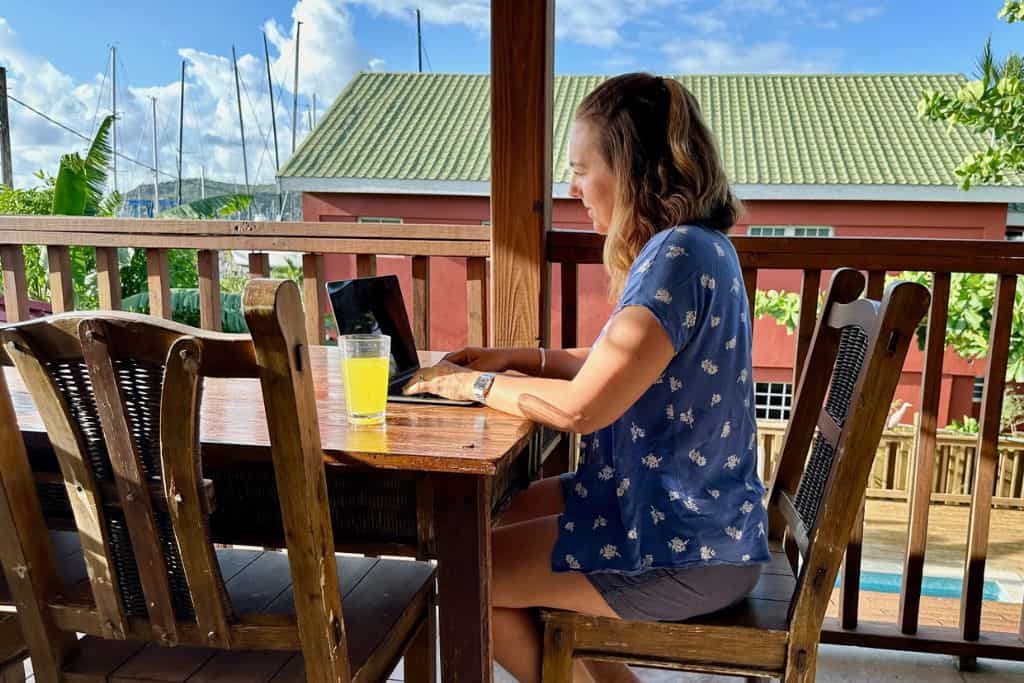
Tax
I know, none of us like to pay taxes, however, they are unfortunately something that we all have to consider whether we’re digital nomads or not.
As we’re not financial experts, we can’t give you any specific advice on paying taxes. However, what we do suggest is that once you’ve decided on which country you’d like to move to then you’ll want to learn more about the tax implications of moving there. And, the best way to do this is to get specialist financial advice.
Health and travel insurance
You’ll definitely need to have some sort of health insurance cover. You’ll need to make sure that it’s comprehensive and covers you for your time away. We’ve had friends whose kids have been unwell and needed hospital stays. They were grateful for their travel insurance as it covered some pretty hefty medical bills.
Researching family-friendly locations
When you start to consider where to go you’ll want to research family-friendly locations as a digital nomad family. With this in mind, it’s important to consider factors such as safety, healthcare facilities, and availability of activities and facilities suitable for children. For instance, we always think about how we’ll find new friends for Cameron. Look for places that have family-oriented communities, access to parks or recreational activities, and some good educational options for your children. You’ll also need to prioritise areas that have reliable internet connectivity and infrastructure that with caters to you remote work needs.
Popular digital nomad destinations include places such as Bali, Chiang Mai, or Lisbon. Thats’s because they often offer family-friendly environments with support networks and activities for kids.
How will your kids make friends?
This may not matter as much for very young children. However, for school-aged kids and teens they are likely to want more lasting friendships. Transitioning to the digital nomad lifestyle can also be challenging when the kids have to leave their friends behind.
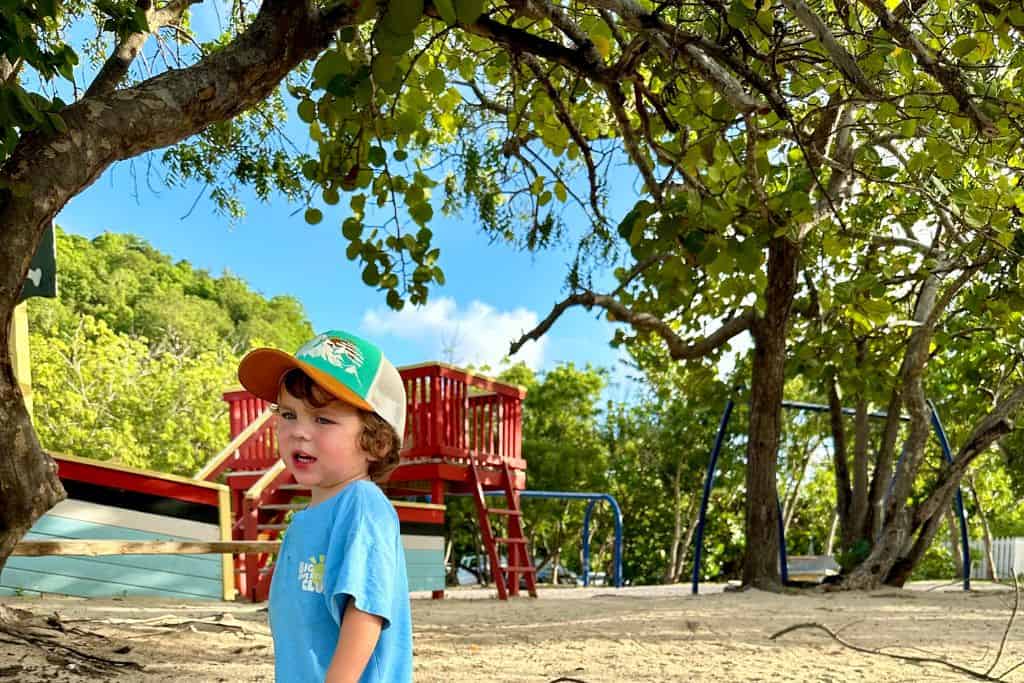
For Cameron, we make sure to visit local beaches or play areas and to interact with other families. In Antigua this is really easy as we researched the most popular family friendly beach in the area and went there a few afternoons in a row. Cam would just head over and play with other kids. After a few days, we noticed the same children on the beach. So, I started to strike up conversation with their parents and we made friends that way. Maybe your kids have a particular sport or activity that they enjoy that they can continue on their travel. Cam loves trying to play tennis so we take him to tennis lessons wherever we are and he meets new friends at classes whilst I get to chat to and meet the parents.
How will you handle language barriers?
Language barriers shouldn’t stop you and your family from experiencing new places. The nomadic lifestyle offers an amazing opportunity to learn new languages through immersion. This is especially true if you spend a longer period of time in one country or region. After our 6 weeks in Spain Cameron was happily chatting away with other kids in the play park. He’d greet them with an hola and see them off with a cheery hasta luego. We have Italian friends who arranged English lessons for their 5 year old and 3 year old before they arrived in Antigua. The girls are now enjoying the same pre-school as Cam. Prepping some language skills in advance can make the transition easier, there are lots of great apps to choose from.
Depending on where you are travelling, there are also bilingual schools and nannies that can help.
Considering safety and security
Before we travel we always check the safety of a country. For us, safety isn’t just about crime and political unrest. It also means making sure that we’re aware of any illnesses the country might have. Or, such things as whether they have safe drinking water. In Antigua we always make sure that both boys sleep under mosquito nets and wear kid safe repellent. This is because there are regular issues with Dengue fever, which we want to protect them from.
Finding suitable accommodation
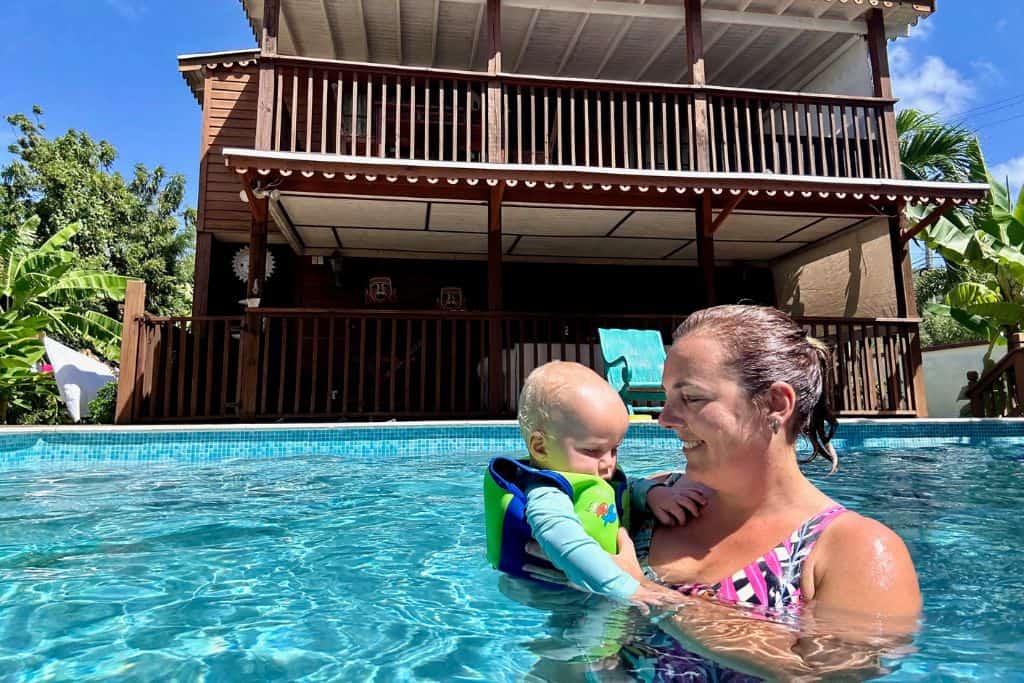
Finding the right accommodation is a key element of planning to become a digital nomad family. You need to make sure that you have a comfortable and functional space that caters to both your work and family needs. Once you’ve decided where to go, you’ll need to decide what sort of accommodation will work for you.
We’ve lived in a variety of different accommodation types that have worked well for where we were, how we were travelling and our budget. In Baiona in Spain we lived in onboard a motor yacht that Carl was skippering as the owner was away. In Eastern Europe we lived in a camper van for a month as we travelled from city to city. And in Antigua we rent a house as we’re there longer and like to have a base with a pool.
When we’ve looked for a house, the best thing we’ve found is to look on sites such as AirBnB. We book our first month through them because this gives us time to arrive to the country. We then look locally for a place to stay longer term which works out cheaper. We’ve also joined local pages on Facebook and asked for recommendations of places to stay.
Some digital nomad families decide to go for a turnkey solution that combines accommodation with communal spaces or co-living options. This allows them to connect with other families and build a supportive community. One of these that we’ve herd of is called Boundless Life. Flexibility is key, as you may want change locations frequently based on your work and travel plans.
Budgeting as a digital nomad family
You’ll need to start your journey to becoming a digital nomad family by remembering that it’s not a holiday. And that you’ll have to remote work at the same time as fitting in time to explore your local surroundings. For example you might not be able to afford the expense of visiting huge waterparks or other local attractions on a daily basis like you would on a holiday. We’d suggest giving yourself a daily or weekly budget and try to make sure that you don’t overspend. Especially, if like us, you still have the expense of a house in your home country. You’ll also soon realise that you won’t have time to go sightseeing every day as you would if you were tourists because you need to have a work/school week.
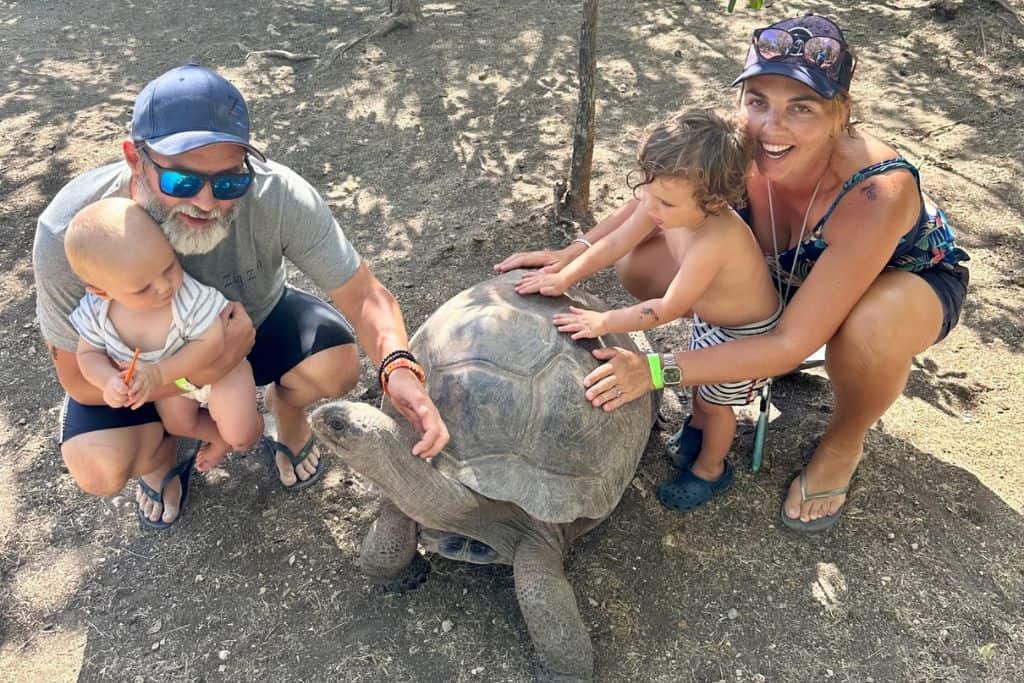
Before you leave you’ll want to have a good idea of the cost of living in the country you plan to stay in. And to be aware of what might cost more or less than you usually expect to pay. For instance, Antigua can be expensive, the cost of nappies for our baby is incredible. We go from paying US$5 for a packet of 50 to paying over US$30. With this in mind, we always pack lots of nappies when we fly over. I think that this is why most people tend to head to countries that are cheaper, such as Bali and Thailand.
We’d also suggest having an emergency fund for when a big expense creeps up on you. You might be driving a camper van and suddenly it has issues and needs some repairs in the garage and you’ll need to have the money to cover these surprise costs.
Education and childcare
This can be one of the biggest stresses and concerns for digital nomad parents. Especially as they start to prepare to make the transition to a nomadic lifestyle with their children and often move away from a traditional school that they’re used to. The great news is that there are now lots of options available to choose from such as:
- Homeschooling
- Online schooling
- World schooling and their hubs
- Local or international schools
Currently Cameron goes to a local pre-school in Antigua and one in the UK in our home country. When we are in Europe we tend to manage childcare between us and not worry about schooling as he’s only three years old. We’ve been researching options for when he’s older as we fell he’ll need a bit more of a structured approach.
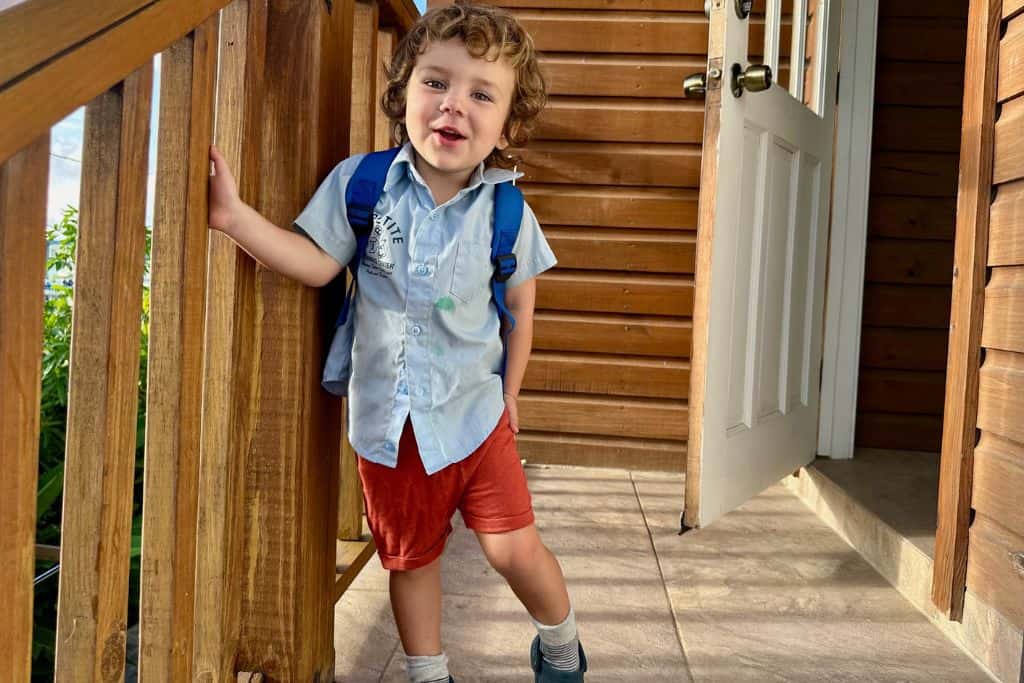
Homeschooling
Some of our friends in Antigua have older kids and have decided to home school them. Home schooling is where one or even both of the parents will spend time each day teaching their kids different subjects based on a specific curriculum. It’s not necessarily classroom based, so you can teach from anywhere and it’s flexible to fit around when you want to teach them.
Online schooling
Alternatively, if you’re not keen to teach your child yourself then you could decide to sign them up for an online school. The great thing about online schooling is that it takes away the stress of having to teach your own children. It still follows a curriculum which is great if, for instance, you leave the UK and want your kids to continue studying the UK qualifications so that they can re-enter a British school in a few years time.
Worldschooling
This is a more general term for families that teach their children through travelling for typically longer periods of travel time. Some families choose to completely unschool their children. This is where there is no curriculum and the children lead what they’ll learn and they use travel opportunities to learn from. For example they’ll learn history at historical sites and local culture by visiting communities.
It’s possible to have a more group approach so it can worth signing up for worldschooling hubs near to where you’ll be staying. You can usually find details of these by joining online digital nomad family communities through social media. We’re part of several of these communities and often see world schooling hubs promoted on them. A world schooling hub is generally where families get together with other families to teach the kids in a group environment. If your kids are missing their friends then this is a great way to help them to meet other kids and to make new friends.
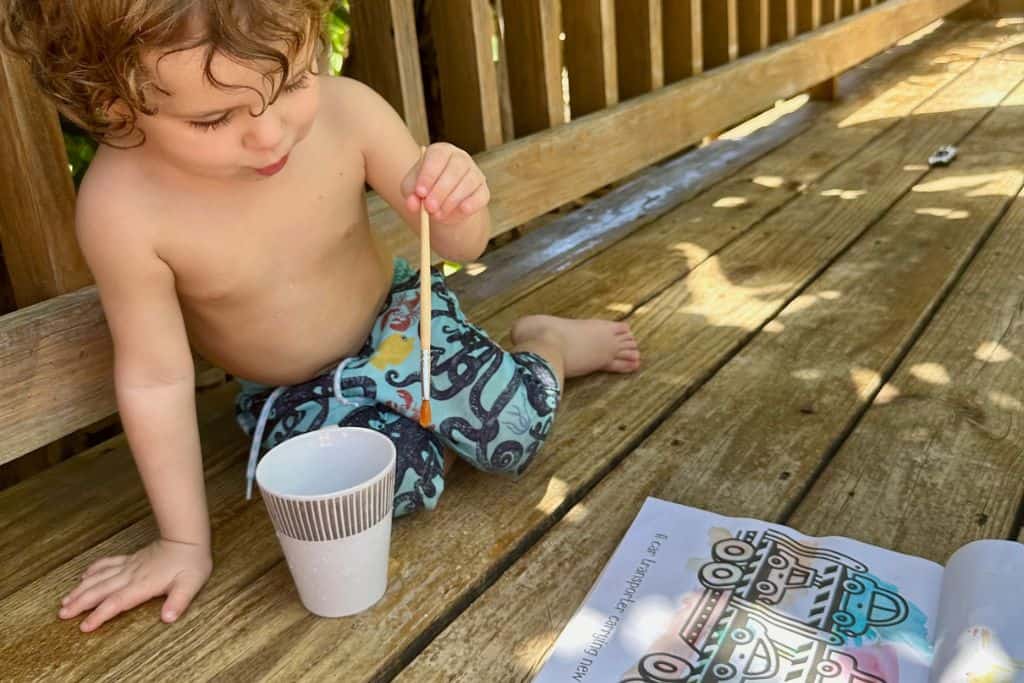
Local or international schools
If you’re thinking of setting up roots somewhere for a decent amount of time, then you might choose to enrol them in a local or international school. For a more formal approach that might align more with the curriculum of your home country an international school might be the right option for you.
Our son Cameron goes to a local pre-school in Antigua and it’s been great as he’s made loads of friends there and now has a busier social life than we do! We found the school he goes to by asking our local friends where their kids were going to school. We tried two pre-schools before finding one that worked for Cameron.
We’ve already enrolled Cam into a local primary school (there are huge waiting lists in Antigua), so that he has a place for when he starts primary school in the UK in 2025.
Nanny
I’m currently on maternity leave which has given me the time to start my travel blog. In Antigua a friend met a cool Canadian girl on the beach called Kathleen who is a nanny and introduced her to us. Kathleen comes to our house twice a week to look after baby Dylan, so I can spend time writing. She also comes a couple of evenings a week to look after both boys so that Carl and I can head out.
During our travels I’ve found that there are various ways to find a nanny to help with childcare. You can search for online agencies which I’ve used before on a business trip to Portugal. Or, local FB groups where I’ve asked for recommendations from other mums. The great thing is that Kathleen is coming back for the following winter to nanny for Dylan every weekday morning when I return to work.
Travelling with pets or having them looked after at home
We love our dog Cavendish a lot. However, he’s 10 years old and become a sensitive soul and hardly enjoys 30 minute car rides these days. We couldn’t imagine popping him onto a plane to come to Antigua. Instead, we use Trusted Housesitter to help us to find people to live in our house in the UK to take care of him. How it works is that you give the sitter all of the details of looking after your pet and home. And in return the house sitter gets to stay at your place for free. There’s an annual membership fee, but other than that, there aren’t any costs. It’s worked really well for us and we can’t recommend it enough.
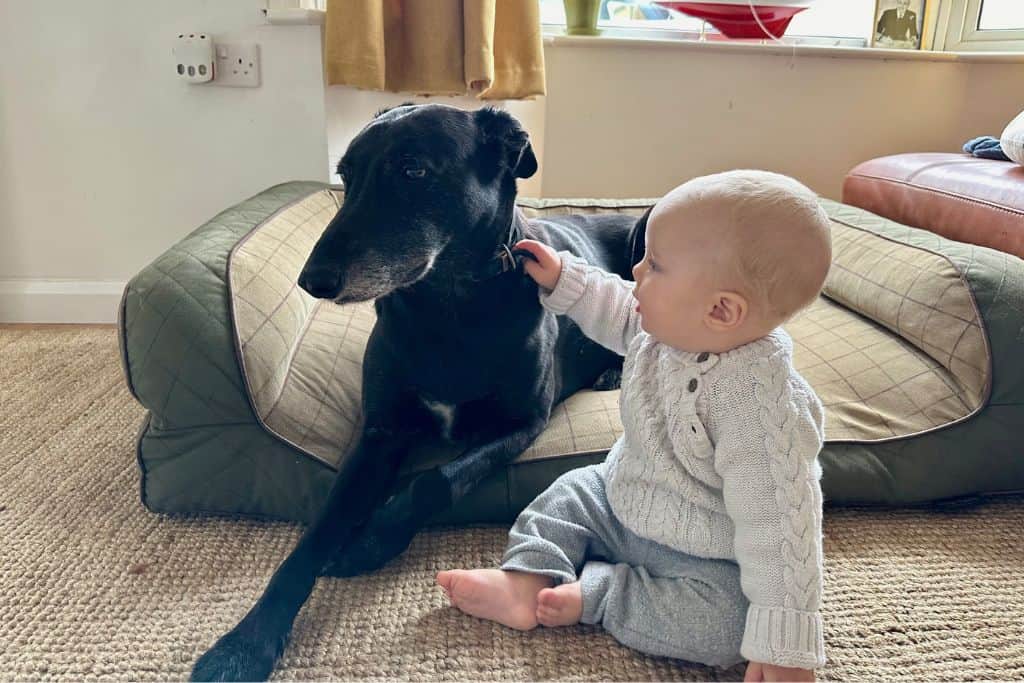
We’ve not travelled with Cav Dog, but we do have plenty of friends who do travel with their pets. The main deciding factor on this would be cost, as travelling with pets can be expensive depending on what you need to do in advance of their travel, for example to they require extra vaccines, or medical treatments.
Have a contingency plan
This sounds like an insane thing to put on a list of exciting things to think of before you travel, however, we’re really recommend having a contingency plan. During our time in Antigua, we’ve met a lot of families who have followed their dreams of taking their kids to live on boats to sail the world. They’ve then started this awesome adventure and it’s simply not worked out for one reason or another.
What would happen if one of you wasn’t enjoying the nomadic lifestyle? Some of the time I’ve met families where the mum has headed home with the kids and then joins the dad at various times around the world as the kids just don’t love being onboard. What if the children don’t love it? I’ve also met digital nomad parents who’ve suddenly realised that their children are unhappy and haven’t adapted to the lifestyle. Being prepared for challenges is important.
Tips for balancing work and travel with kids
We wanted to share a few tips on balancing work, travel and kids together using some of experiences as a starting point.
Managing a flexible work schedule
This means being able to adjust work schedules so that you can enjoy sightseeing or spending your afternoons with your children. In our experience it’s very important to communicate on how you’ll each be managing your workload and also ensuring that you have the flexibility to still enjoy time exploring the new country you’re in. It can also require a lot of flexibility from your employer to allow you to flex your work hours.
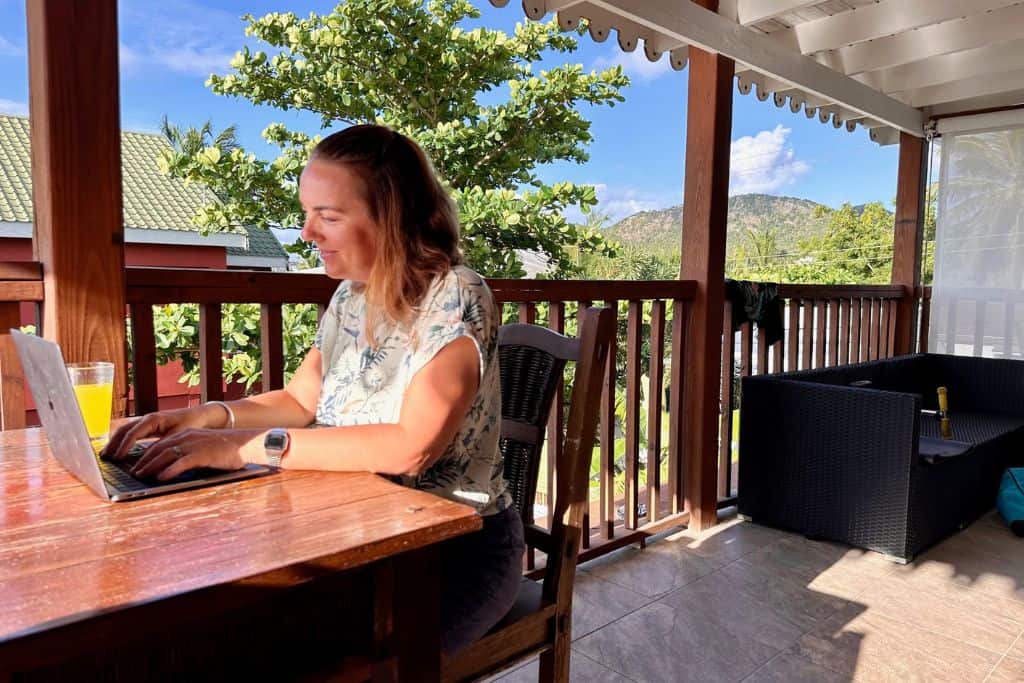
For us we choose to make it work so that when we are in Antigua we both work in the mornings whilst Cameron is at school. This means we then have the afternoons to hang out as a family. Then sometimes in the evening, Carl heads back to work to socialise with the guests onboard the yacht. It’s worked really well for us doing it this way, you’ll need to find your own rhythm.
Involving kids in planning and decision-making
Especially for older children, you’ll want to encourage them to have an input when choosing destinations or accommodations. This will give them a voice in the family’s travel plans so that they feel more engaged and involved.. This can be as simple as allowing them to discover and suggest new activities or attractions in the area to visit.
It’s been shown that when kids feel involved, they become more engaged and interested in the travelling which helps to create memorable and enjoyable experiences for everyone. Also, learning to make decisions and contribute to family choices helps to promote their independence and problem-solving skills which in itself is a valuable life lesson.
Finding a supportive community
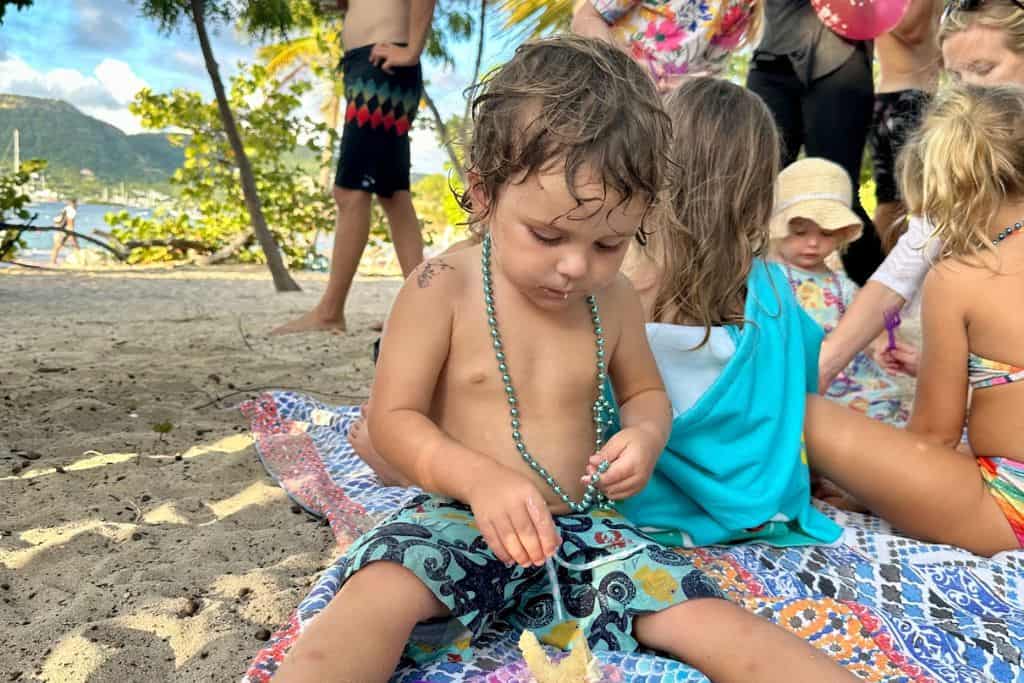
We find that it’s important to meet up with likeminded families where you share your experience, socialise and form long lasting friendships. There are a few ways to find other digital nomad families online such as online forums, social media groups, and local meet ups sites. For us, it’s worked well hanging out on the beach or play park and just chatting to families as Cameron starts to play with their kids.
If you’re on your first trip then maybe joining in a turnkey solution such as Boundless Life will offer the supportive community that you initially need.
Understand the kids perspective
We think it’s important to regularly check-in on your kids and learning how they’re finding the nomadic lifestyle experience. For us this means making sure that Cameron is enjoying the experience as much as we are. During our recent Portugal trip we sadly discovered that Cameron was missing his friends at home in the UK, and that this was making him sad.
As we were moving quite regularly we’d not really had a chance to spend so much time chatting with other kids at the play parks or on the campsite. To change this, we (the parents) introduced ourselves to families with similar aged children and asked them to have play dates with us in the play area after breakfast each morning. Once Cameron had met other kids and was playing he suddenly felt less sad.
Best destinations for digital nomad families
The great thing is that you can potentially be a digital nomad anywhere in the world. However, some countries lend themselves to it more and even encourage it by offering easy to apply for visas and even organisations to help you with the transition such as the case in Malaysia and Thailand. You’ll also want to make sure that you have the education options and accommodation choices that you’d expect.
We’ve put together a quick list of the countries that we hear about time and time again that you should check out:
- Lisbon, Portugal
- Barcelona, Spain
- Chiang Mai, Thailand
- Bali, Indonesia
- Hoi An, Vietnam
- Playa del Carmen, Mexico
Final Thoughts on being a digital nomad family
Writing this post has made us realise how much we love our digital nomad family life. It’s also reminded us of the benefits and challenges that come with this lifestyle and the way that as a family we’ve been able to adapt. We really hope that we’re inspired even one family to take the leap to follow their dream
